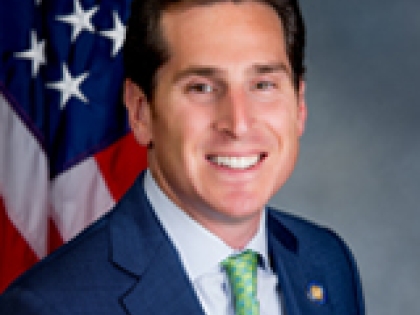
State Senate to subpoena real estate agents, firms in housing probe
The State Senate will issue subpoenas to up to 67 real estate agents and company representatives to probe allegations of housing discrimination revealed in a recent Newsday report, lawmakers announced Thursday.
Some 68 agents and companies were requested to appear at a Senate hearing Thursday sparked by Newsday’s “Long Island Divided” series. But just one did so.
“The remaining 67 individuals either neglected to respond or outright refused to provide testimony,” Sen. James Skoufis (D-Woodbury), chairman of the Senate Committee on Investigations and Government Operations, said midway through the hearing at Hofstra University. “There’s an easy way to go about things and a hard way. So, following today, subpoenas will be served to many of these individuals to compel their testimony.”
Under grilling by senators, M. Ryan Gorman, president and CEO of Reology Holdings Corp.’s NRT, a real estate giant, acknowledged the Newsday series showed a “pervasive” problem of discrimination. Asked if the company owed African-Americans an apology, Gorman said he personally apologized and vowed the company would review its training of agents.
"This process has led me to believe we need to have our own training and to augment" state-mandated training, Gorman said. “I think what was uncovered in the Newsday investigation was severely disappointing.”
Senators pressed Gorman on whether real estate agents covertly shared information or language with one another on how to steer customers while not specifically violating fair housing protections. Sen. John Liu (D-Queens) accused NRT of being fully aware of discriminatory practices by some agents.
Gorman replied: "Under oath and for the record, definitely I and NRT were not aware of these practices.”
The head of the New York State Association of Realtors told the senators his trade group was “appalled” by what Newsday’ had found.
“If there is one message we want to convey to you today, it is this: We are appalled by the actions reported by Newsday involving real estate licensees, and NYSAR wants to work with New York State to be a part of the solution moving forward,” association president Moses Seuram told the lawmakers.
Seuram said the group, after the Newsday report was published, suspended its real estate agent training classes statewide with the intention of revamping them. The report showed current methods weren’t effective he said.
Ineffective was an “understatement,” replied Sen. Brian Kavanagh (D-Manhattan).
As the five-hour hearing drew to a close, Skoufis promised Thursday’s panel was “just the beginning,” and said the Senate would be “deadly series” about following up on the subpoenas and pursuing action in Albany when lawmakers return in January for the 2020 legislative session.
State senators launched the hearing Thursday by calling evidence of unequal treatment of potential minority homebuyers by real estate agents that was raised in an extensive report by Newsday “alarming” and “repugnant.”
“These alarming allegations run contrary to our proud, 400-year history,” Skoufis said in opening remarks, regarding the founding of New York. “This is not who we are or, at minimum, not who we ought to be.”
Sen. Todd Kaminsky (D-Long Beach) called the Newsday findings of housing bias a “national embarrassment” and vowed to “use the investigative powers of the Senate” to further delve into real estate practices on Long Island.
The Senate probe is just one of several announced following publication of the Newsday series. Gov. Andrew M. Cuomo and Attorney General Letitia James also have said they will investigate. Two state legislators have proposed a bill that would expand the state’s authority to suspend or revoke a real estate agent’s license.
During the hearing, a housing expert testified that real estate discrimination and steering of customers into certain neighborhoods is no longer overt, but now is more subtle. A black or Hispanic homebuyer no longer gets a door literally slammed in her face, said Fred Freiberg, co-founder of the Fair Housing Justice Center and a consultant on the Newsday project.
“Today, the image of slammed door has been replaced with a revolving door … (clients) are simply steered way from their desired housing,” Freiberg said. “Violators have simply learned to conceal their discriminatory conduct.”
A significant problem, witnesses said, is the state doesn’t spend money to deploy testers to investigate discrimination, which leads consumers to believe filing complaints will be pointless.
“People know nothing is being done,” said Elaine Gross of the group Erase Racism. “It almost makes it worse, pretending there is a system in place to deal with this issue and to have a system so broken that the perpetrators know nothing is going to be done and the victim knows nothing is going to be done if they file a complaint.”
Asked by senators to grade, on a 1-10 scale, how seriously the state takes housing discrimination, Gross said: “I would put it at a minus-1.”
She added: “The state is failing to do its job with rigor and urgency.”
At one point in the hearing, the Senate played video clips showing a real estate agent describing ethnic neighborhoods and changes to a local school district to one of the white undercover testers deployed by Newsday and appearing to steer the customer away from those. In other clip, an agent described “pockets” of bad areas, telling the would-be customer to follow the school bus and see the moms coming to greet it, and concluding, “I don’t use the word ‘steer,’ but I try to educate” customers.
Earlier, Arthur Browne, the project director for Newsday, outlined the newspaper’s findings for the Senate panel, including 49 percent of African-American testers receiving what housing experts deemed unequal treatment by realtors, and 39 percent of Hispanic testers.
Nassau County Executive Laura Curran told the panel she believed the actual rate could be higher and the newspaper was, if anything, conservative in how it counted incidents of unequal treatment.
“It’s very clear to me they erred on the side of caution and the numbers were probably not as low as reported,” Curran said.
Suffolk County Executive Steve Bellone urged lawmakers to create a consumers’ “bill of rights” to govern interactions between consumers and realtors and mortgage lenders.
In its three-year investigation, Newsday sent testers carrying hidden cameras and microphones to meet with real estate agents and record the meetings. The findings included evidence that potential homebuyers were steered to neighborhoods based on race and that agents require preapproved mortgages from black customers but not white ones.
With Candice Ferrette
